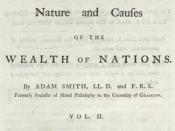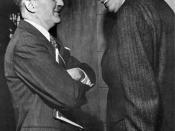Today, in classrooms across the country, Liberal economic theory is being taught to students eager (or not so eager) to soak it in like so much "mother's milk." The language of the Liberal approach has been infused into various elements of American life - everything from the educational marketplace, to U.S. foreign policy (by way of economic sanctions, or loans). With so many minds focused on, and operating according to the same principles, one must stop to wonder whether those adherents of Liberal doctrines really understand the history behind and application of their own theory. In today's world of Liberal buzz-words like, "globalization" and "free trade" it is the task of the observer as well as the adherent to cut through the jargon and arrive at the root of the discussion - Liberal economic theory and its role in the international political economy of the 21st century. The following will present a brief outline of the history behind today's Liberalism, Liberalism's view of the role it should play in international political economy (IPE), as well as a critical evaluation of the policies enacted by its current practitioners.
Before beginning, it seems necessary to define the main term in the discussion - Liberalism. The word itself means many things to many people, but for the purposes of this essay Liberalism refers to an economic approach that values market autonomy, meaning the market should be allowed to function freely, without the interference of the state (in the case of the U.S., the Federal Government). Another key aspect of Liberalism is the suggestion that a system comprised of individuals, working to meet their own personal ends, will result in the betterment of society as a whole. In his book Global Economy, Global Justice George DeMartino describes the aforementioned phenomenon in the following way,


